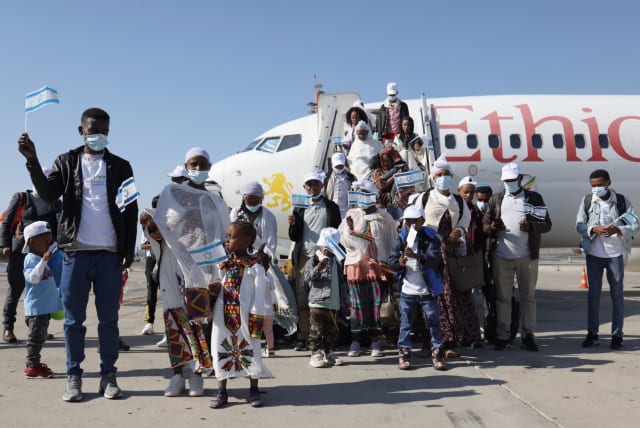Operation Tzur Israel reaches milestone: 5,000 Ethiopian olim reunited

The second phase of Operation Tzur Israel, an initiative aimed at facilitating the Aliyah of relatives of Ethiopian Jews to Israel, was completed on Wednesday, as 130 new immigrants arrived.
A wave of joyous reunions filled the air in Ben Gurion airport on Wednesday as 130 new immigrants from Ethiopia, known as Olim, landed on Israeli soil. This arrival marks the successful completion of the second phase of Operation Tzur Israel, a government-led initiative aimed at facilitating the Aliyah of relatives of Ethiopian Jews to Israel.
Launched in June 2022, the second phase of the operation has been successful in relocating 3,000 Olim from Ethiopia, following the 2,000 immigrants brought over in the operation's first phase that started in December 2020. A majority of the newcomers, 70% to be precise, are under the age of 35, signifying a robust young demographic boost. Half of these fresh arrivals are children and teenagers eager to start their new lives in the Jewish homeland.
Facilitated by The Jewish Agency for Israel, Operation Tzur Israel has now managed to reunite a total of 5,000 Ethiopian Jews with their families in Israel, many of whom had been separated for a long duration. The Agency, in collaboration with the Aliyah and Integration Ministry, the Interior Ministry, the Population Authority, and other organizations, coordinated 18 special flights for this mission. The support of Jewish Federations, Keren Hayesod, private donors, foundations, and friends of Israel from Korea and around the world was instrumental in realizing this feat.
Once in Israel, the new immigrants are settled into one of 18 absorption centers, run by the Aliyah and Integration Ministry and The Jewish Agency. These centers serve as transitional hubs where the Olim are provided with financial support, Hebrew language education, and resources for their integration into Israeli employment and educational systems. To accommodate the inflow, five new absorption centers have been opened, making a total of 25 operational centers throughout the country.
According to a statement by the Jewish Agency, during the course of Operation Tzur Israel, specialized programs were also developed to optimize the integration of the Olim into Israeli society. Notably, the Aliyah Tech program was launched to pave a path for young Ethiopian immigrants to join the high-tech industry in Israel.
Israel's Ethiopian immigrants
Mark Wilf, Chairman of the Board of Governors of The Jewish Agency, reflected on the success of Operation Tzur Israel, stating, "By completing this milestone in Operation Tzur Israel, and continuing to facilitate the Aliyah and absorption of Ethiopians who have long yearned to arrive in the Jewish homeland, we have actualized the core value of the State of Israel and the Jewish people to advocate for the most vulnerable individuals among us."
It is important to note that the majority of Ethiopian immigrants in recent times are not recognized as Jews based on Jewish Law and may not qualify for aliyah under Israel's Law of Return. The overwhelming number of immigrants are relatives of Israeli citizens who are granted Israeli citizenship as a compassionate endeavor.
Advocates for the Gondar and Addis Ababa communities contend that individuals ineligible for aliyah are the offspring of Jews whose predecessors were compelled to embrace Christianity and hence should be permitted to undertake aliyah.
The Israeli government and the Jewish Agency have made multiple announcements declaring the official conclusion of aliyah from Ethiopia. Over the years, various special operations have been conducted since the 1980s to facilitate the immigration of the Beta Israel community. The positive outcomes of these efforts have prompted the government and the Jewish Agency to announce several times that the official aliyah from Ethiopia has come to an end. However, subsequent renewals have occurred on multiple occasions.
In 2015, the government made a commitment to continue the immigration of Ethiopians who have a first-degree relative in Israel. However, the implementation of this decision has been only partially realized in practice. Many past governments have procrastinated when it came to executing the decision fully.During the month of May, hundreds of Ethiopian olim protested outside of the weekly cabinet meeting in Jerusalem, demanding support for continued immigration from Ethiopia.
The protest also focused on the fact that the current budget, “does not include a budget for aliyah from Ethiopia.”
Jerusalem Post Store
`; document.getElementById("linkPremium").innerHTML = cont; var divWithLink = document.getElementById("premium-link"); if (divWithLink !== null && divWithLink !== 'undefined') { divWithLink.style.border = "solid 1px #cb0f3e"; divWithLink.style.textAlign = "center"; divWithLink.style.marginBottom = "15px"; divWithLink.style.marginTop = "15px"; divWithLink.style.width = "100%"; divWithLink.style.backgroundColor = "#122952"; divWithLink.style.color = "#ffffff"; divWithLink.style.lineHeight = "1.5"; } } (function (v, i) { });

